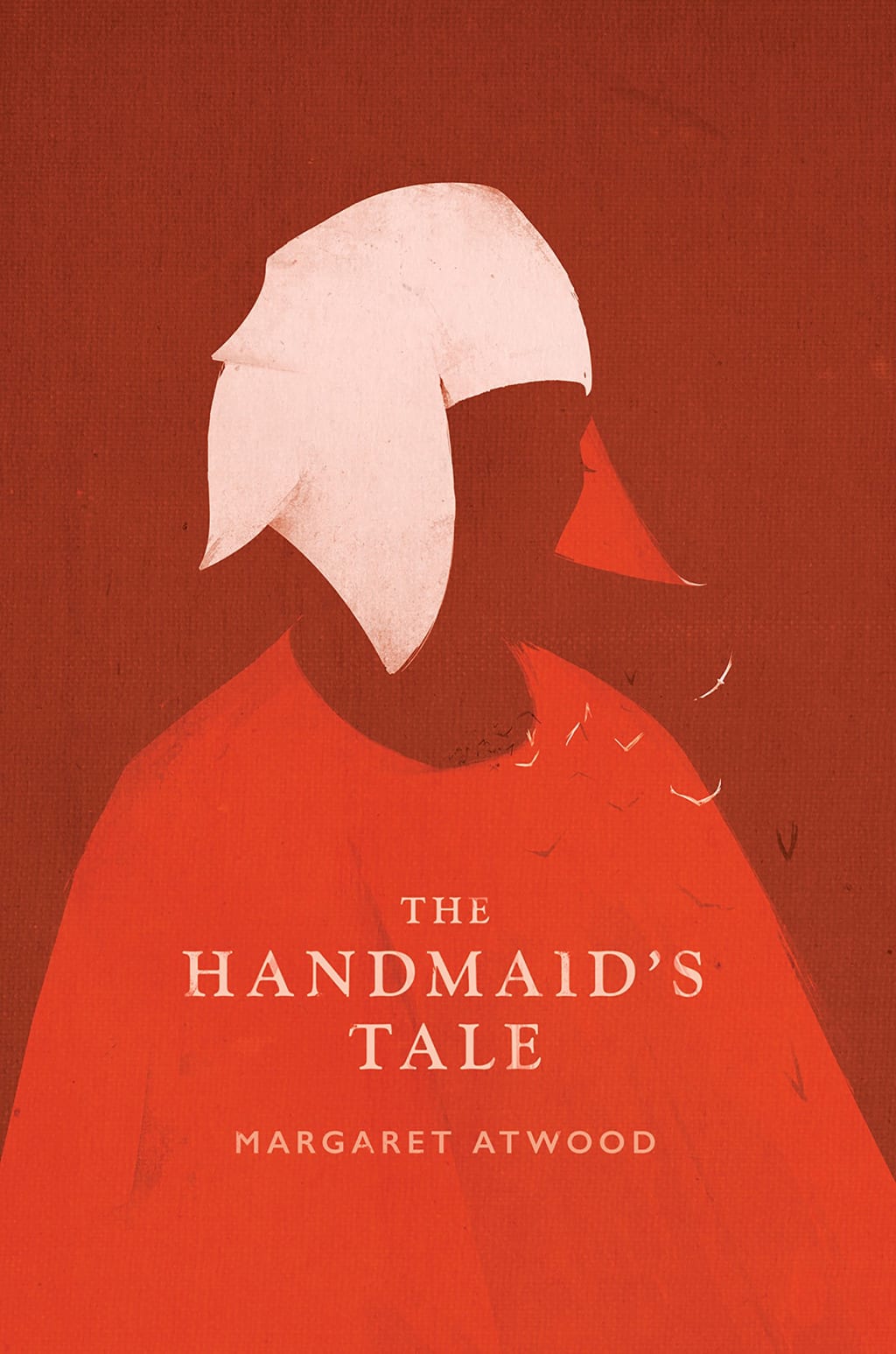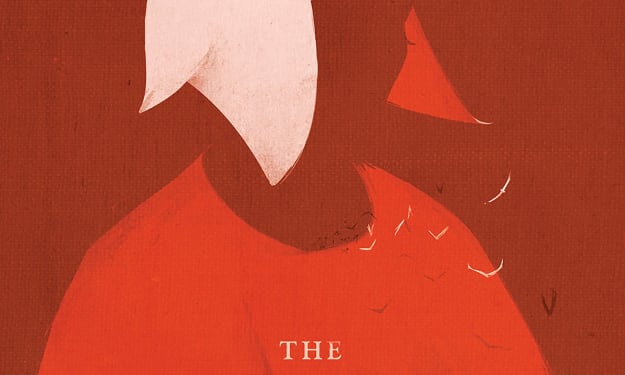
Chapter 6
Offred often describes Ofglen as pious and deliberates on whether it’s sincere or for show. In her inner monologue, she talks of her wings which she calls “blinkers.” Handmaids wear the wings to “keep them from seeing, and also from being seen.” This is Gilead’s approach to eliminating sexual harassment of Handmaids while they do their chores. The wings are also symbolic of the tightly defined space the Handmaids are allowed to roam. Their vision is limited, as is their understanding of the outside world.
As they walk, Offred reminisces on the surroundings, the buildings and landmarks that used to be. This is a theme that will repeat throughout the book, seemingly average things that “used-to-be.” “When we think of the past, it’s the beautiful things we pick out. We want to believe it was all like that.” This is true and shows Offred’s tendency to cling onto the past to rationalize the present. She mentions that old American past-times, like football, are still played, for men at least. Offred mourns her limited avenues, not being able to view the river, walk on the bridges, or use the subway because there’s no official reason to do so. Even sight-seeing and hobbies have stripped away from the women in Gilead.
Offred muses that the centuries-old church is still untouched by Gilead. From the description of paintings depicting “women in long somber dresses, their hair covered by white caps,” we can guess that these were paintings of Puritan women, which was the main inspiration for the concept of Handmaids by Margaret Atwood. “They haven’t fiddled with the gravestones, or the church either. It’s only the more recent history that offends [Gilead].” Namely, we can presume, this “recent history” has to do with the progressive, egalitarian businesses, schools, and landmarks.
Offred observes Ofglen bowing her head as if she’s praying. She’s suspicious of her partner’s every quirk, as she’s been conditioned to do so. If you’re constantly being watched, it’s easy to be constantly paranoid and untrusting. She wonders if Ofglen lost someone, but backtracks because she thinks Ofglen is acting the part of the dutiful Handmaid in order to survive. “But that it what I must look like to her, as well. How can it be otherwise?”
One of the more disturbing practices in Gilead is hanging the bodies from the Salvagings on The Wall from hooks. In this chapter, there are six bodies hanging with filthy, bloody bags over their heads. She makes macabre comparisons of the bloody bags to faceless dolls, “like scarecrows, which in a way is what they are, since they are meant to scare.” She notes one bag with blood seeping through it that makes the shape of a mouth on the outside of the bag. The bodies are wearing white coats, meant to represent their living occupation as doctors or scientists. They have placards depicting human fetuses, declaring them as proponents and possibly practitioners of abortion.
Offred deliberates on how each of the accused were caught. She guesses that medical records had something to do with it or informants. There’s also a tidbit of how untrusting Gilead is of women, that there has to be two women to give corroborating evidence of a crime to be considered valid. It paints a picture of how desperate times were pre-Gilead, that people would give up patient records and names of medical professionals to save themselves. However, “informants are not always pardoned.”
Citizens in Gilead have been indoctrinated to regard these hanging bodies as war criminals, even if abortion was legal when they committed their “crime;” “their crimes are retroactive.” Offred has also been indoctrinated into the belief: “No woman in her right mind, these days, would seek to prevent a birth, should she be so lucky to conceive.” But her humanity is still intact, as she doesn’t regard the hanging bodies with hatred as she’s been taught to. She sees the bodies as “time travelers, anachronisms. They’ve come here from the past.” Such a statement is ironic, because you’d expect there to be less progress in human rights the further you go back in time; but, since Gilead is literally going back to the days of Puritans and male dominance, it’s like the past should be the future.
Offred compares the red smile to the tulips in Serena Joy’s garden. She tends to compare the macabre with the mundane in her narrative, a clue into this limited, backwards society becoming routine. I’m reminded of prisoners in the Holocaust camps saying that the horrific happenings became routine after a while, that even moving dead bodies was a chore like any other. The chapter ends with such a poignant remark of such a phenomenon: “Ordinary… is what you are used to. This may not seem ordinary to you now, but after a time it will. It will become ordinary.”
Chapter 7
Offred’s only free time to herself is at night. These sections usually involve her remembering her past before Gilead, how she keeps herself grounded and sane. By reminding herself of her past, she’s not fading away into this new identity as the captive. During these sections, I will refer to her as the Narrator, because she wasn’t Offred in these memories before.
The Narrator describes how she uses nighttime to “step sideways out of my own time. Thought this is time, nor am I out of it.” It’s as if she’s in a car deciding where to go within her memories, her only sense of freedom is in her mind. She chooses a memory from college when she was studying and hanging out with her best friend, Moira. Moira wears strange clothes and accessories to “be eccentric,” has a talent for “borrowing” things without repercussion, and owns up to her quirky antics. It’s notable that Moira’s writing a paper about date rape, which the Narrator makes a joke about.
Next, her memory shifts to when she was a child in the park with her mother. Her mother had promised her they’d go to the park to feed the ducks, but she was really there to be with her friends at a book burning. From first glance, you might think that her mother was a prudish religious woman bent on burning porn magazines from this memory. We’ll revisit this later. She remembers throwing a magazine showing a naked woman into the fire, recalling how the flames burned the woman, turning her into ash before her eyes. A none too subtle metaphor and foreshadowing of the fate of women much later.
She then flashes to a memory of just after her daughter was taken from her and she was captured, presumably by Gilead for trying to flee. The Narrator muses that she must have been drugged, because days were going by in flashes and she was being constantly moved in her unconscious state. They tell her that her daughter has been placed in a “fit family,” meaning that the Narrator is established to be “unfit” by Gilead for some reason. They show her a photo of her daughter, but the Narrator accuses them as killing her. In a way, Gilead has. They’ve killed who she was as the Narrator’s daughter, she was now someone else, holding a new parent’s hand.
The Narrator hopes that this is a story, not her real life. She desperately wants this to be a story, so there will be an ending, a happy ending where she could continue her life from before. So she tells this story in her mind as a defense mechanism, something to hope for in this hopeless situation. It appears like she’s telling her story to you, the reader, which she is in a fourth-wall kind of way. But her hope fades often and without regress: “I’ll pretend you can hear me. But it’s no good, because I know you can’t.”
Chapter 8
It’s back to Offred’s narrative where she’s out with Ofglen again by The Wall. She opens the chapter innocuously, remembering back when the summer weather would hold and they could wear sundresses to go get ice cream. But then in the same paragraph, she’s explaining about new bodies hanging on The Wall. Here we learn of the other demographics that Gilead considers enemies, with a priest (Catholics) and two Guardians that were caught committing “gender treachery” (homosexuality). She remarks that the priest had been put in the black cassock for the trial, since they stopped wearing those when the sect wars began.
Gilead condemns any sects that disagree with their prescribed Christian doctrine. Though, it is particularly interesting that none of the Gilead officials or doctrine mentions Jesus Christ, the so-called Son of God for whom the religion is based on. This was purposeful to show that Gilead’s doctrine was not sincerely followed by its leaders, that it’s more of a pecking order of power elites. After all, haven’t we heard of cult-leaders in real life that lived lavishly and contemptuously by their own religious teachings? Take David Koresh, the self-acclaimed prophet of the Branch Davidians, which would ultimately lead to the infamous Waco fiasco. He was accused of child abuse and statutory rape, allegedly having sex with girls as young as thirteen. There are some in Gilead that do believe in the doctrine, even some Commanders I’m sure, but we can assume the majority of them want the money, power, and dominion over their Wives and state-sanctioned concubines.
Offred resents Ofglen’s actions, which she compares to being robotic. Ofglen remarks that it’s a beautiful May day, which triggers Offred’s memory of the word mayday when she learned it from Luke. He says that the origin of the word mayday was from the French, m’aidez, or help me. As Ofglen and Offred are walking, a funeral procession of black-veiled women. The Econowives wear striped dresses of blue, red, and green to represent that they do all the duties as the poor women of Gilead. The bereaved mother holds a black jar to hold or represent the baby that died before it could be born. Offred mentions the term Unbaby, which could mean abnormal babies that couldn’t survive out of the womb. Offred and Ofglen make a show of solidarity to the women, but they scowl and spit at the Handmaids. Handmaids are regarded as whores by other castes.
Offred returns to the house and sees Nick polishing his car. She makes note of the tulips, ripe and upturned like chalices, which could symbolism for Offred’s role as a Handmaid. Nick makes small talk with Offred, which she only nods to. She recalls rhetoric from Aunt Lydia, how God made men to desire sex, but didn’t make women to and it was up to women to make the boundaries. Kind of a weird thing to say when a society regards women as having no boundaries, no right to even refuse.
Offred sees Serena Joy lazing in her chair in the garden. She then thinks that her name is stupid, the chosen moniker that she used to have when she was a TV evangelist and gospel singer. Offred compares the name to the brand names of hair-straightening chemical. Offred remarks that Serena Joy’s real name was Pam, though if you read the epilogue, it’s suspected that all of the names were changed anyway. Offred then remembers when Serena Joy was making speeches about women’s pre-ordained destiny by God to be domestic servants. Offred remembers when someone tried to shoot Serena Joy and missed and her secretary was killed; she also recalls a story in which someone planted a bomb in Serena Joy’s car, but the public thought she had planted it herself as a publicity stunt. Offred remembers turning down for bed with Luke long ago while these events were happening, watching it on the news. Luke found her antics to be funny; the Narrator found them to be “a little frightening.”
The best paragraph in this chapter, maybe even the book, is the following: “She doesn’t make speeches anymore. She has become speechless. She stays in her home, but it doesn’t seem to agree with her. How furious she must be, now that she’s been taken at her word.” So, women these days in our reality wanting to turn back the clock on women’s rights, remember: You’re a woman, too. It’s a clear pattern that occurs on Fox News and CNN programs when some female political pundits make big claims without realizing they aren’t exempt from their own hypocrisy. Or evangelical women that are female preachers with enough money to feed all the migrant children at the border but not enough sense to realize their message is misogynistic. Sorry, let me kick my soapbox back into the closet.
Offred tries not to stare as she walks past Serena Joy into the house. She considers her (Serena Joy’s) face to be sinking in upon itself, “those towns built on underground rivers, where houses and whole streets disappear overnight, into sudden quagmires, or coal towns collapsing into the mines beneath them.” Such a description is what happened to society, even to those that supported it. In a flash, freedoms were replaced with borders, equality became immaterial, and a meaningful life became a purposeful life. In this society, any other aspiration besides having a family is frowned upon and even punished.
The dividing line between Wives and Handmaids is, at its core, jealousy and contempt. Wives hate the Handmaids because they can bear children and they cannot. Wives hate having to share their husbands with the Handmaids. Handmaids hate the Wives because they are facilitators of the state-sanctioned rape “Ceremony” and of the fact that the Wives will essentially kidnap their children upon their birth. Aunt Lydia’s advice is, as ever, dry and disingenuous… the handmaids should feel sorry for the barren women they serve and forgive their transactions, “for they not what they do.”
Offred’s contempt for Aunt Lydia is shown through her mockery of her gestures and hyperbolic prose, “the gaze upwards, through the round steel-rimmed glasses, towards the back of the classroom, as if the green-painted plaster ceiling were opening and God on a cloud of Pink Pearl face powder were coming down through the wires and sprinkler plumbing.” If you couldn’t guess by that, Offred thinks of Aunt Lydia as a drama queen.
Offred comes back to the present and into the kitchen, where it smells of freshly made bread. The smell makes her remember when she was a mother and made bread herself. She regards the smell as “treacherous;” possibly because it would make her cry. She hands her parcels over to Rita and Rita singles out the chicken, cleaning it of the giblets. She remarks that it’s scrawny, but “it would have to do.” It’s not hard to compare Rita’s comments about the chicken and her opinion of Offred.
Offred gets another attack of memory while regarding the dish towel by the sink. “Dishtowels are the same as they always were. Sometimes these flashes of normality come at me from the side, like ambushes. The ordinary, the usual, a reminder.” Rita tells Offred that she should speak up because she belongs to an elite military family. Rita regards Offred with contempt because she’s “common.” This is another side effect of Gilead’s caste system, the disparaging divide between them. This society pits woman against woman in order to quell rebellion. Cora and Rita talk about Offred’s bath like she’s just another chore to do around the house. In Offred’s position, she is a mere commodity, much like the chicken Rita’s preparing to cook.
While Offred goes upstairs to return to her room, the Commander is in the hallway. Offred wonders why he’s in the hallway and it frightens her. She compares this strange occurrence to warnings from encroaching battle frontlines and warnings from animals to scare away predators. She sees him as a threat and wonders if his appearance in the hallway was just that. Then the final line of the chapter ends with “I called it mine,” meaning that she claimed ownership of the room even though she’d be trying not to. It’s a sign that she’s assimilating against her will, that she’s molding into the structure of Gilead.
About the Creator
CD Turner
I write stories and articles. Sometimes they're good.






Comments
There are no comments for this story
Be the first to respond and start the conversation.